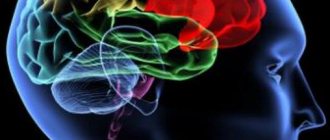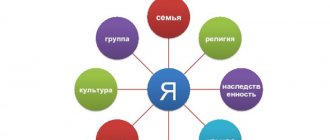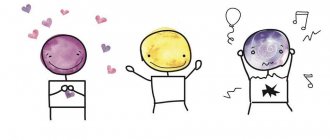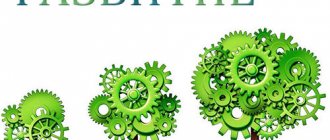Developing the mind and intelligence is a very difficult task, but extremely necessary in the life of every person. We talked about why this is so in the article “Development of intelligence. What to do to become smarter." Also in this article we talked about how to develop intelligence, but we, of course, did not consider some features.
One of these, in our opinion, is the mechanisms of the psyche, corresponding to the generally accepted understanding of intelligence. Therefore, in this article we want to talk about intelligence not from the perspective of external indicators of intelligence, but based on certain functional mechanisms.
Intelligence: Definition and Understanding
First of all, we need to formalize the definition of intelligence. To do this, it is necessary to establish a framework for the application of this concept that will not allow its meaning to be blurred. The most general boundary can be called the need to understand the object of intellectual effort, which is possible only with creative activity, and it must be conscious.
Creative activity here should be understood as the use of creative thinking to find solutions to problems, develop new options for action, etc. Simply put, this is the most direct manifestation of the skills of adaptability to everything new.
It is important to note that understanding intellectual mechanisms is absolutely pointless if you do not take into account the functionality of consciousness, and also the fact that without consciousness any development of new adaptive skills is completely impossible. Without this, it is foolish to expect the emergence of life experience that corresponds to the constantly changing conditions of reality.
This leads us to the second condition for applying the concept of intelligence: intelligence is a manifestation of conscious activity, and this manifestation is noticeably different from established behavioral patterns and stereotypes. Many people who have a wealth of life experience often resort only to past actions of their intellect, without demonstrating anything that would correspond to the present. That is why intelligence is closely interconnected not with the ability to solve problems (even a computer can do this), but with the ability to creatively approach the search for new solutions.
Let's try to understand the phenomenon of intelligence at least in the most general sense. When a person is born, he does not have intelligence, from which it follows that intelligence is acquired through personal experience and is formed under the influence of the environment at all stages of human development.
Intelligence indicators can subsequently be assessed using a huge number of IQ tests and analysis of the adequacy of human behavior. Behavioral adequacy is expressed in accordance with what is received and what is desired - if as a result of one’s actions a person receives an unexpected result, most likely his behavior is not entirely adequate to the situation (for example, if out of 100 attempts to do something, in 70 cases you achieve what you want, then your intelligence is 70% effective in the field of actions performed).
Also, intelligence cannot be considered something purely abstract - the ability to solve mathematical problems or puzzles, etc. Intelligence can be called the effectiveness of absolutely any reaction, because it always implies the use of a subjective model of action in appropriate circumstances (for example, a composer can shine with intelligence in music, but at the same time remain a complete layman in other areas).
To describe the mechanisms of the psyche, it is not at all necessary to disassemble the essence of intelligence. This is a philosophical term that appeared even before the mechanisms of adaptability began to be studied by science. However, the concept of intelligence turns out to be one of the most popular, in particular, in the field of comparing the effectiveness of people's adaptive skills in different areas of their application.
As a rule, the level of this effectiveness (relative to the use of creative skills in social life) is assessed by IQ tests, which make it possible to quickly and fairly reliably analyze the individual potential of each person. But these tests are not very suitable when you need to test active intelligence, because... they are strictly limited in time, which does not allow for real creativity in finding solutions.
Tests can test existing problem-solving skills in familiar conditions, rather than establishing the effectiveness of a creative approach in finding such solutions (this often requires developing various intermediate skills). In addition, IQ tests are suitable for a small number of tasks, but they do not cover larger areas.
Each person has awareness mechanisms for adapting to new conditions and developing new options for action that form behavioral skills based on personal experience. So in situations that are important for a person, but have nothing to do with other people, the manifestation of this person’s intelligence may not be perceived by others at all.
Based on the conditions of applicability of the concept “intelligence” that we have considered, it must be understood as mechanisms that ensure a person’s awareness in completely new and significant situations and the creative search for new behavior options corresponding to them. This also includes testing these options for effectiveness in real conditions, evaluating the results and forming new behavioral patterns.
The development of new behavioral options occurs with the help of creative search skills (automatisms), which can develop in new conditions, gradually being supplemented with “fresh” components. The product of intellectual activity is expressed here in new behavioral automatisms in new circumstances, due to which the life experience of reaction becomes broader.
If we do not take into account the time during which intelligence manifests itself in the process of developing skills, intellectual potential will be expressed in the creative potential of a person’s adaptability to new conditions regarding a specific form of activity.
For this reason, it is inappropriate to compare the intellectual potential of different people. This can only be done if it is used in similar areas. So, you can be an intellectual in literature, science, mechanics, solving life problems, cooking, politics, business, etc. But it is impossible to compare intellectual skills and intellectual potential of different areas.
Among other things, the manifestation of intelligence can be expressed in the life experience a person acquires, and effectiveness in this case will be the degree to which the experience corresponds to reality (i.e., how well the actions correspond to the desired result).
As we have already said, intelligence in different areas of application of life experience cannot be compared in terms of performance indicators. However, one should never lose sight of the fact that intelligence, regardless of what area of application of life experience a person has to deal with, can be developed.
Personal qualities of parents
Children with a high level of intellectual and creative development, parents usually have a positive attitude towards life and love their work.
Parents of children with a high level of intellectual development are energetic and dynamic, prefer cultural pastimes, and are distinguished by independence of opinion, nonconformism, and freedom in decision-making.
If parents themselves have a high level of development of creative and intellectual abilities, if they give the child the opportunity for development, support him and respect him, then this has a beneficial effect and helps the child realize his maximum potential.
Be an example for your child!
Development of intelligence
Speaking about the development of intelligence, first of all it must be said that people who think about this topic are not doing the right thing, because do not ask themselves specifically what kind of intelligence, i.e. what creative skills should be developed. And this omission often becomes a stumbling block for people, an obstacle on the way.
You need to understand that the skills of understanding and perception may well develop independently of the skills of effectively performing any actions. This is clearly demonstrated by a variety of spiritual practices. Thanks to them, some people, for example, perceive and realize something that does not exist in the material world. Their confidence in the perception of this something is extremely high, but at the same time they do not need to back it up with a practical analysis of whether it corresponds to reality.
Without going into further detail, we can simply say that a person should develop only what will serve to develop the skills necessary from a practical point of view. A person begins to master new elements of behavioral reactions, and as a result, part of the intellectual potential (skills of finding new solutions) is activated, which is interconnected with a specific area of activity and specific conditions.
And when a person tries to develop something for the future, he already begins to engage in self-improvement, believing that what he develops will definitely be useful to him. Next, we will not continue to talk about the development of intelligence (once again we advise you to read our article “Development of thinking. What to do to become smarter”), but will touch on another equally important issue.
School influence
At school, obedience is most valued. This often acts as a limitation for creative children. Many restrictions, rules and patterns stifle their natural originality.
Back in the twentieth century, the Italian Maria Montessori proposed an education system in which each child studies at his own rhythm, that is, individually. This led to positive results. But since freedom and independence are not allowed by society, the Maria Montessori method is not used.
5
Degradation of intelligence
Perhaps you yourself understand perfectly well that everything that is not used eventually becomes unusable, and this also applies to intelligence (by the way, we also recommend reading the article “Maintaining a clear mind and intelligence in old age”). This can be called one of the simplest forms of adaptation of the body, based on the characteristics of the environment and the need to perform actions.
All mental skills, just like metabolism, immunity and physical condition of a person, correspond to the principle of adaptability. To maintain their tone, they must be used. Remember how, after a couple of weeks of bed rest during an illness, you felt somehow “uneasy” about walking and doing your usual activities. Likewise, if intellectual skills are not in demand, they begin to fade, gradually be forgotten, etc.
Scientifically speaking, if the brain is inactive for a long period of time, entire neural structures begin to die, consisting of synoptic contacts, branching neuron bodies, neurons themselves, dendrites and axons. So the development of intellectual skills requires that the intellect perform specific tasks, and they must be important and meaningful to the person.
As for the passivity of the intellect (and especially of modern man), today we can name the real factors that serve as the cause of intellectual degradation:
1
First factor
Currently, you can find a huge amount of formalized information on a wide variety of activities. These are instructions, guides, manuals, recommendations and advice that pass from mouth to mouth. This leads to the fact that any attempts to develop one’s own skills in the area of interest in many cases only harm the person and take away his time. The creative initiatives of employees in many organizations today, unfortunately, are nipped in the bud. A person is only required to master an effective technique and simply follow the regulations.
Let’s not argue, there are many areas of activity where intelligence cannot be done without, where it is in demand, where only with its help can one create and create. However, the need for people who mindlessly do what they are told is many times greater than the need for creative, creative and proactive highly intelligent people. The latter, in turn, leads to the fact that the intellectual potential of such people stands idle and fades as unnecessary.
Increasingly, specialists with a narrow specialization are appearing who only need to maintain their existing level of intelligence. It is these people who can be called “automata”, “cogs” in a variety of systems. Those who continue to develop their intellect on their own initiative and stretch this process over years are disproportionately smaller.
Creativity, which we have already mentioned more than once, is significantly different from everything that is created according to diagrams, templates and instructions. The product of any creativity is originality and uniqueness. The value of creativity lies precisely in the ability to create something new, unusual, but still relevant, and this can safely be called symbols of the use of high intelligence.
2
Second factor
Living conditions today are increasingly susceptible to standardization, which is manifested in generalized cultural ideas. The level of creative originality is declining. Due to the abundance of various forms that provide a comfortable life, people stop making mistakes that make them think. Sometimes there are even some mental abnormalities that are not particularly evident in social life. But the consequences of all this are by no means disappointing.
For many people, it becomes a credo to sit back and live at the expense of other people. The quality of culture is rapidly declining. Because of generally accepted norms and even some laws, people get used to living without intelligence, but under any other circumstances this could cost them their lives. And this is another reason for the degradation of people's intelligence.
But people who encourage such a social structure themselves strive to preserve and develop their intellectual potential. Otherwise, society would be in danger of destruction. This indicates that, in general, it is not worth saying that the intellectual capabilities of society are declining. But still, the ratio of highly intelligent and low-intelligent people is shifting towards the latter.
Despite this, it makes sense to talk about the weakening of this trend in any area, and it is thanks to this state of affairs that a certain stability is maintained. But this stability is sometimes achieved at the expense of social conflicts, many of which arise precisely because of people with low intelligence, but at the same time behaving on an equal footing with others, and sometimes even considering themselves smarter and more important than others.
Special attention is deserved by the fact that in large cities the two factors of intellectual degradation outlined above are of greater importance than in provincial cities. Therefore, in “more developed” places there is a special state of mind of their inhabitants and an increased level of intellectual degradation. And this despite the fact that it is there that the largest number of intellectually developed people are located, systematically engaged in developing their thinking (we also recommend reading the article “Problems of High IQ”).
We hope that the information presented, although not fully, still helped you get closer to understanding intelligence and its mechanisms, and on its basis you will be able to draw certain conclusions for yourself: is it worth developing intelligence, what influences its development, etc. .d. But at the end of our article, we would like to talk a little about one more topic - the topic of genius.
Personal qualities of the child
Much depends on character and temperament. For example, it will be quite difficult for phlegmatic people to express themselves at school. They may begin to be considered incapable simply because of their temperament.
Children can be roughly divided into thoughtful and impulsive. The former can delve into the task and work with it as much as they need, despite the complexity. The latter are aimed at quick results, so they often give the answer that first came to mind. This makes the learning process difficult.
Also, thoughtful children avoid participating in the life of the group (class) and try not to get into unfamiliar social situations. Impulsive people easily join the team and are not afraid to take risks.
6
Genius
In some cases, when a person exhibits high intellectual activity in creative activity, it may be accompanied by what, based on certain characteristics, is perceived as genius.
If we understand the meaning of the mechanisms that form the basis of the psyche and determine intellectual potential, as well as the essence of this potential itself, we can talk about an extreme state of intellectual creativity, i.e. about genius. As a rule, genius is the degree of intellectual potential that contributes to the creation of extraordinary and particularly outstanding creative results.
The state of genius is distinguished by its characteristics of mental as well as physiological organization. And these characteristics are such that without painstaking and quite serious work, you simply shouldn’t expect any brilliant ideas and results. Among these characteristics are:
- The required level of energy and energy, depending, among other things, on the characteristics of blood movement through the vessels, metabolism and ventilation of the lungs. If they do not meet certain parameters, the human body will not have the opportunity to fully develop creative skills.
- Regardless of the level of energy and energy, a person must have a motivating force - something that will constantly push him to action and force him to stick to the chosen direction. Otherwise, a person will not even lift a finger, because he will not have any goal.
If these two characteristics are present, and their combination turns out to be suitable, a person becomes dissatisfied with the current state of affairs, which requires conscious volitional efforts to change. And when the understanding of a particular situation accumulates and reaches a critical point, that same insight occurs, called genius. If a person lies on the couch and looks at the ceiling, he better not count on any revelations.
What is genius? First of all, this is a constant stay in the process of comprehending some creative idea, incessant brain activity that prevails over everything else. It does not stop even when a person is sleeping, because it is of such great importance to him that it receives nourishment from most existing areas of perception.
This activity does not appear on its own or out of nowhere. This is a consequence of painstaking study and thinking about a certain problem or situation that plays the most important, almost the main role in a person’s life (one of such situations may be a state of love, when it is impossible to think about anything else).
The conclusion follows from this: in order to do truly brilliant things, it is not at all necessary to be a natural genius or to inherit some genetic traits from your ancestors. The state of genius can be achieved artificially by “getting sick” with something completely and irrevocably. This “disease” activates maximum intellectual potential, thereby leading to a state of creative genius.
We are deeply convinced that every person should develop thinking and intelligence. This should not be influenced by the environment, circumstances, or any other reasons. The only thing that should have an impact is a sincere desire to develop, become better and smarter. We wish you to have this desire, never stop at anything and, of course, collect as much information as possible about the work of intelligence and its features.
Let our article serve as another coin to your knowledge bank. We sincerely wish you good luck and achieving new heights!
We also recommend reading:
- Storytelling
- Wechsler test
- How to become smarter: 4 types of intelligence according to Stephen Covey
- Gardner's Theory of Multiple Intelligences
- What You May Not Know About Intelligence
- Erudition and intelligence: why they only work together
- Intelligence and its development: several recommendations
- To develop or to degrade?
- Deep Learning: What is the essence of the deep learning method?
- Cattell-Horn-Carroll theory
- General Intelligence Factor
Key words: 1LLL, 1Cognitive science
Family factors
The more children there are in a family, the lower their IQ. This was proven in the 1970s in the Netherlands. The number of people studied was more than 300,000 young men with an average age of 19 years. Moreover, firstborns, as a rule, are smarter than their younger brothers and sisters.
Also, the level of development of a child depends on the social environment. In France, a study was conducted in 1980: they compared the IQ of children from poor families, but raised in a privileged class, and their brothers and sisters raised in a lower social class. The difference was approximately 20 points in favor of those brought up in a privileged society.
4










